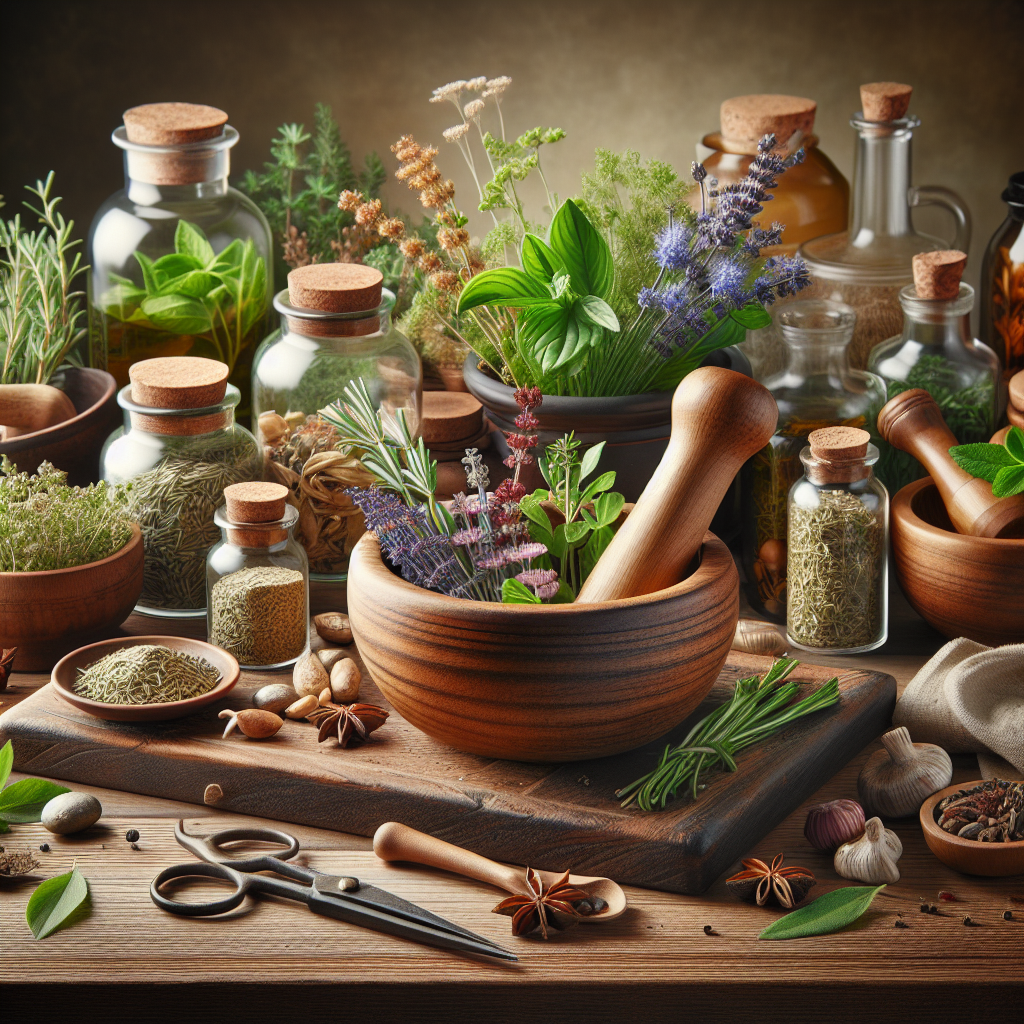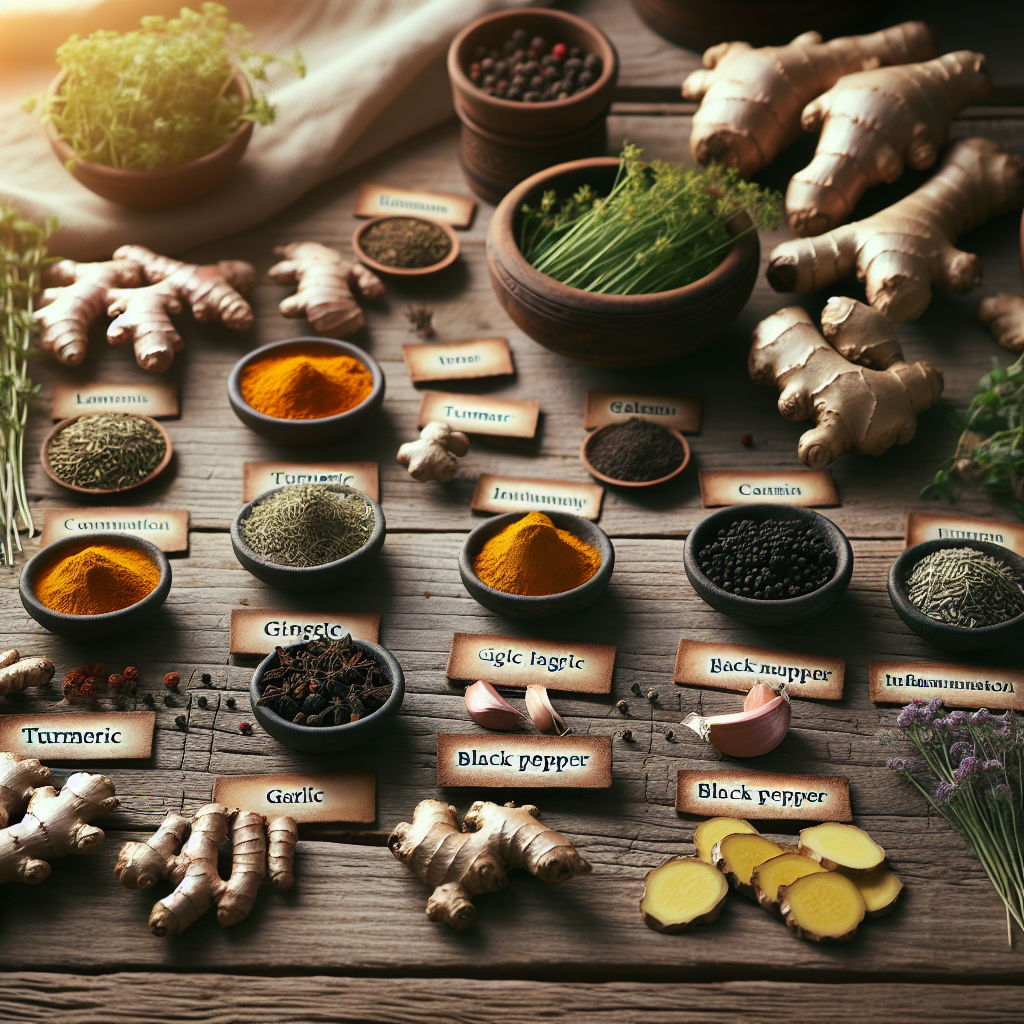Herbs That Help Reduce Inflammation Naturally

Discover the power of natural remedies! Learn about herbs that help reduce inflammation naturally. Make a positive change in your health today. Visit My Vibrant Vitality now.
Top 10 Herbs That Naturally Reduce Inflammation
Inflammation is a natural response of the body to injury or illness. However, chronic inflammation can lead to various health problems, including heart disease, cancer, and arthritis. Fortunately, nature has provided us with a plethora of herbs that can help reduce inflammation naturally. This article will explore the top ten herbs that have been scientifically proven to have anti-inflammatory properties.
Turmeric, a golden spice commonly used in Indian cuisine, tops the list. It contains a compound called curcumin, which has been extensively studied for its potent anti-inflammatory effects. Curcumin works by inhibiting the activity of enzymes and proteins that promote inflammation, thereby reducing swelling and pain.
Ginger, another spice widely used in Asian cooking, is also known for its anti-inflammatory properties. It contains compounds called gingerols and shogaols, which have been shown to inhibit the production of inflammatory chemicals in the body. Moreover, ginger has been found to be particularly effective in reducing inflammation associated with osteoarthritis and rheumatoid arthritis.
Rosemary, a fragrant herb often used in Mediterranean cuisine, is rich in antioxidants that help combat inflammation. One of these antioxidants, called rosmarinic acid, has been shown to suppress inflammatory responses in the body, making rosemary a great addition to your anti-inflammatory diet.
Green tea, a popular beverage worldwide, is packed with antioxidants called catechins. One of these catechins, epigallocatechin-3-gallate (EGCG), has been found to have powerful anti-inflammatory effects. EGCG works by inhibiting the production of pro-inflammatory cytokines, thereby reducing inflammation.
Cinnamon, a sweet spice used in both savory and sweet dishes, contains a compound called cinnamaldehyde, which has been shown to inhibit the production of inflammatory substances in the body. Additionally, cinnamon has been found to improve blood sugar control, which can further help reduce inflammation.
Cloves, a spice known for its warm and sweet flavor, are rich in eugenol, a compound that has potent anti-inflammatory properties. Eugenol works by blocking the activity of enzymes that promote inflammation, making cloves a great addition to your anti-inflammatory diet.
Basil, a fragrant herb commonly used in Italian cuisine, contains a variety of anti-inflammatory compounds, including eugenol, linalool, and citronellol. These compounds work together to inhibit the production of pro-inflammatory cytokines, thereby reducing inflammation.
Oregano, another herb widely used in Mediterranean cuisine, is packed with antioxidants that help combat inflammation. One of these antioxidants, carvacrol, has been shown to suppress inflammatory responses in the body, making oregano a great addition to your anti-inflammatory diet.
Thyme, a versatile herb used in a variety of dishes, contains a compound called thymol, which has potent anti-inflammatory properties. Thymol works by inhibiting the production of pro-inflammatory cytokines, thereby reducing inflammation.
Lastly, black pepper, a spice commonly used in cooking, contains a compound called piperine, which has been shown to have anti-inflammatory effects. Piperine works by inhibiting the activity of enzymes that promote inflammation, making black pepper a great addition to your anti-inflammatory diet.
In conclusion, incorporating these herbs into your diet can help reduce inflammation naturally. However, it’s important to remember that while these herbs can help manage inflammation, they should not replace conventional medical treatment. Always consult with a healthcare professional before starting any new dietary regimen.
Exploring the Anti-Inflammatory Benefits of Herbal Remedies

Inflammation is a natural response of the body to injury or illness, acting as a protective measure to isolate affected areas and initiate the healing process. However, chronic inflammation can lead to various health issues, including heart disease, cancer, and autoimmune disorders. In the quest for natural remedies to combat inflammation, many have turned to the world of herbs, which offer a plethora of anti-inflammatory benefits.
Turmeric, a vibrant yellow spice commonly used in Indian cuisine, is renowned for its anti-inflammatory properties. The active ingredient in turmeric, curcumin, has been extensively studied for its potent anti-inflammatory effects. Curcumin works by inhibiting the activity of enzymes and proteins that promote inflammation, thereby reducing swelling and pain. It’s worth noting that curcumin is not easily absorbed by the body, so it’s often recommended to consume it with black pepper, which contains piperine, a compound that enhances curcumin absorption.
Ginger, another spice with a long history of medicinal use, is also a powerful anti-inflammatory herb. Ginger contains compounds called gingerols and shogaols, which have been shown to inhibit the production of inflammatory chemicals in the body. Moreover, ginger has been found to be particularly effective in reducing inflammation associated with osteoarthritis and rheumatoid arthritis.
Green tea, a staple in many Asian cultures, is another herb known for its anti-inflammatory benefits. The key to green tea’s anti-inflammatory power lies in its rich content of catechins, a type of antioxidant. One particular catechin, epigallocatechin-3-gallate (EGCG), has been shown to inhibit the production of certain inflammatory chemicals, thereby reducing inflammation and protecting cells from damage.
Rosemary, a fragrant herb often used in cooking, is also a potent anti-inflammatory agent. It contains several compounds, including rosmarinic acid and carnosol, which have been shown to have anti-inflammatory effects. These compounds work by inhibiting the production of inflammatory chemicals and reducing the activity of inflammatory cells.
Lastly, we turn our attention to the humble garlic, a common ingredient in many cuisines worldwide. Garlic contains a compound called allicin, which has been shown to have potent anti-inflammatory properties. Allicin works by inhibiting the activity of inflammatory enzymes, thereby reducing inflammation and offering relief from associated symptoms.
In conclusion, herbs offer a natural and effective way to combat inflammation. Whether it’s the vibrant turmeric, the warming ginger, the soothing green tea, the fragrant rosemary, or the humble garlic, each of these herbs brings a unique set of anti-inflammatory benefits to the table. However, it’s important to remember that while these herbs can help reduce inflammation, they should not replace conventional medical treatment. Always consult with a healthcare professional before starting any new treatment regimen. Furthermore, incorporating these herbs into a balanced diet and maintaining a healthy lifestyle are crucial for managing inflammation and promoting overall health.
Harnessing the Power of Herbs for Natural Inflammation Reduction
Inflammation is a natural response of the body to injury or illness, acting as a protective measure to isolate affected areas and initiate the healing process. However, chronic inflammation can lead to various health issues, including heart disease, cancer, and autoimmune disorders. In the quest for natural remedies to combat inflammation, herbs have emerged as potent allies, offering a plethora of benefits without the side effects often associated with pharmaceutical drugs.
Turmeric, a golden spice native to Southeast Asia, is renowned for its anti-inflammatory properties. The active compound in turmeric, curcumin, has been scientifically proven to reduce inflammation at the molecular level, rivaling some anti-inflammatory drugs in its effectiveness. Incorporating turmeric into your diet can be as simple as adding it to soups, stews, or smoothies, or taking it as a supplement.
Ginger, another spice with a long history of medicinal use, is also a powerful anti-inflammatory herb. Studies have shown that ginger can reduce inflammation and alleviate pain, particularly in individuals with osteoarthritis. Ginger can be consumed fresh, dried, or in supplement form, and is a warming addition to teas, stir-fries, and baked goods.
Rosemary, a fragrant herb commonly used in cooking, is rich in antioxidants and anti-inflammatory compounds. Rosmarinic acid, a key component of rosemary, has been shown to suppress inflammatory responses, making it a valuable herb for managing inflammation. Rosemary can be used fresh or dried in a variety of dishes, or as an essential oil for topical application.
Green tea, while not technically an herb, deserves mention for its potent anti-inflammatory properties. Rich in polyphenols, particularly epigallocatechin-3-gallate (EGCG), green tea has been shown to reduce inflammation and protect cells from damage that can lead to chronic diseases. Drinking a few cups of green tea daily can provide significant anti-inflammatory benefits.
While these herbs can help reduce inflammation naturally, it’s important to remember that they are part of a holistic approach to health. A balanced diet, regular exercise, adequate sleep, and stress management are all crucial components of an anti-inflammatory lifestyle.
Moreover, while these herbs are generally safe for most people, they can interact with certain medications and may not be suitable for everyone. For instance, turmeric can thin the blood and should not be taken in large amounts by people on blood-thinning medication. Similarly, ginger can lower blood sugar levels and may not be appropriate for individuals with diabetes. Therefore, it’s always advisable to consult with a healthcare provider before starting any new herbal regimen.
In conclusion, herbs offer a natural, effective way to reduce inflammation and promote overall health. By incorporating herbs like turmeric, ginger, rosemary, and green tea into your diet, you can harness their anti-inflammatory power and support your body’s healing processes. As we continue to explore the medicinal properties of herbs, we are likely to discover even more ways in which these natural remedies can help us maintain optimal health and wellbeing.